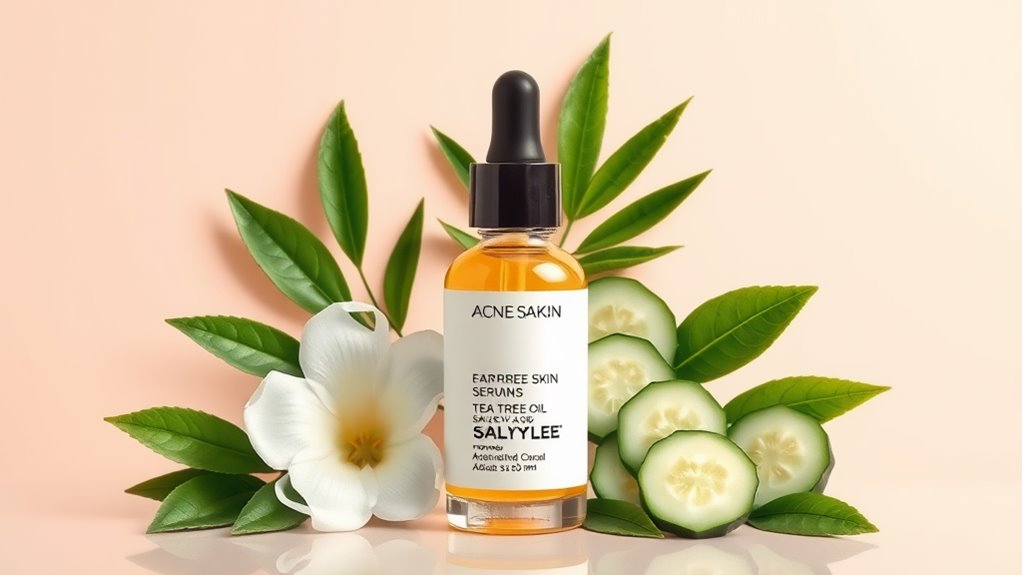Sensitive Skin- Try This Soothing Skincare Routine
If you have sensitive skin, finding the right skincare routine can feel overwhelming. You need products that soothe rather than irritate. By focusing on gentle, hydrating ingredients and avoiding harsh chemicals, you can create a calming regimen. Let’s explore the essential steps and ingredients that will help you care for your skin effectively, ensuring you achieve that healthy glow without the discomfort. What’s the first step you should take?
Key Takeaways
- Start with a gentle, fragrance-free cleanser to avoid irritation and maintain skin comfort during cleansing.
- Follow up with a hydrating moisturizer containing soothing ingredients like aloe vera or chamomile for optimal hydration.
- Incorporate hyaluronic acid serums for an extra moisture boost and improved skin texture.
- Apply broad-spectrum SPF 30 sunscreen daily to protect your sensitive skin from UV damage.
- Always patch-test new products on a small area to ensure they are compatible with your sensitive skin.
Understanding Sensitive Skin
Sensitive skin can feel like a puzzle, often reacting unpredictably to various products and environmental factors. You need to understand that sensitive skin is more than just a condition; it’s a unique trait requiring specialized sensitive skin care.
Factors like genetics, environmental irritants, and lifestyle can trigger redness, itching, or burning sensations.
To master your sensitive skin care routine, start by identifying your triggers. This may include certain ingredients, harsh weather, or stress.
Focus on using gentle, fragrance-free products designed specifically for sensitive skin. By doing so, you’ll minimize the risk of irritation and enhance your skin’s resilience.
Essential Ingredients for Sensitive Skin
When it comes to caring for sensitive skin, choosing the right ingredients is essential. Start with calming agents like aloe vera and chamomile; they soothe irritation and provide hydration.
Look for ceramides, which strengthen your skin barrier, locking in moisture and preventing dryness. Another key player is hyaluronic acid, renowned for its ability to attract and retain water, keeping your skin plump and supple.
Additionally, consider products with niacinamide; this powerhouse ingredient reduces redness and improves overall skin texture.
Avoid fragrances and harsh preservatives, as they can trigger reactions.
Cleansing: Finding the Right Cleanser
How do you choose the right cleanser for your sensitive skin? Start by looking for gentle, fragrance-free formulations that won’t strip your skin’s natural barrier.
Opt for cream-based or hydrating cleansers that contain soothing ingredients like aloe vera, chamomile, or glycerin. These ingredients calm irritation while effectively removing dirt and makeup.
Avoid foaming cleansers or those with harsh surfactants, as they can exacerbate sensitivity. Test the product on a small area first to gauge your skin’s reaction.
Remember, less is more—cleansing twice a day is ideal, but listen to your skin. If it feels tight or uncomfortable, ease off.
With the right choice, cleansing can become a calming ritual that preps your skin for the rest of your soothing skincare routine.
Exfoliation: Gentle Methods to Consider
After finding the right cleanser, it’s time to contemplate exfoliation, which can be tricky for sensitive skin. You’ll want to choose gentle methods that effectively slough off dead skin without causing irritation. Here are some options to evaluate:
| Method | Benefits | Frequency |
|---|---|---|
| Chemical Exfoliants | Smooths texture, promotes cell turnover | 1-2 times a week |
| Enzymatic Exfoliants | Gentle, natural ingredients | 1-2 times a week |
| Soft Scrubs | Physical removal with minimal abrasiveness | 1 time a week |
Moisturizing: Best Practices and Products
Moisturizing is essential for keeping your sensitive skin hydrated and healthy.
You’ll want to focus on ideal ingredients that soothe and nourish, while also mastering effective application techniques.
Let’s explore how to create a moisturizing routine that works for you.
Importance of Hydration
While many people overlook hydration, it’s essential for maintaining healthy skin, especially if you have sensitive skin. Proper hydration helps your skin barrier function effectively, reducing irritation and inflammation.
Start by drinking enough water daily—aim for at least eight glasses. Incorporate a hydrating serum or essence into your routine; these can provide an extra moisture boost without feeling heavy.
When selecting moisturizers, look for those labeled as “hydrating” and “non-comedogenic” to avoid clogging pores. Apply your moisturizer while your skin is still slightly damp to lock in moisture.
Ideal Ingredients to Use
Finding the right ingredients for your skincare routine can make a world of difference, especially for sensitive skin.
Focusing on soothing and hydrating components is essential. Here’s a list of ideal ingredients to incorporate into your products:
-
Aloe Vera – Known for its calming properties, it hydrates without irritation.
-
Hyaluronic Acid – This powerhouse ingredient draws moisture to your skin, keeping it plump and hydrated.
-
Ceramides – They help restore the skin barrier, locking in moisture and protecting against irritants.
-
Chamomile Extract – Renowned for its anti-inflammatory effects, it soothes redness and irritation.
Application Techniques Explained
To achieve ideal hydration for sensitive skin, it’s essential to apply your moisturizer correctly. Start with clean, damp skin; this helps lock in moisture.
Use a small amount—about a pea-sized portion—and warm it between your palms. Gently press the product onto your face, working from the center outwards. Avoid vigorous rubbing; instead, use light, upward strokes. This technique boosts circulation and absorption without irritating your skin.
For extra hydration, consider layering a hydrating serum before your moisturizer. Look for products containing soothing ingredients like hyaluronic acid or ceramides.
Finally, don’t forget your neck and décolletage; they need love too! Master these techniques, and you’ll elevate your moisturizing routine to a whole new level of care.
Sun Protection: Importance of SPF
When it comes to protecting your sensitive skin, daily SPF application is a must.
Choosing gentle formulas can help shield your skin without causing irritation.
Daily SPF Application
Daily SPF application is essential for protecting your sensitive skin from harmful UV rays. Neglecting this vital step can lead to irritation and long-term damage.
To master your sun protection routine, follow these steps:
-
Choose a broad-spectrum SPF**** of at least 30 to shield against UVA and UVB rays.
-
Apply it generously—use about a nickel-sized amount for your face and more for exposed areas.
-
Reapply every two hours, especially if you’re sweating or swimming. Don’t forget to do this even on cloudy days!
-
Incorporate SPF into your daily routine—make it a non-negotiable part of your morning regimen.
Choosing Gentle Formulas
Choosing the right skincare products is essential for sensitive skin, especially when it comes to sun protection. You should opt for gentle formulas that shield your skin without causing irritation. Look for sunscreens labeled as “hypoallergenic” or “for sensitive skin.” These products typically contain fewer harsh chemicals and are less likely to provoke a reaction.
| Ingredient Type | Recommended Options |
|---|---|
| Chemical Filters | Zinc Oxide, Titanium Dioxide |
| Fragrance | Fragrance-Free |
| Additives | Antioxidants, Aloe Vera |
Calming Techniques for Irritated Skin
How can you effectively calm irritated skin? Implementing a few key techniques can make a world of difference. Here’s a concise list to guide you:
-
Cool Compress: Apply a clean, cool cloth to the affected area for 10-15 minutes to reduce inflammation.
-
Aloe Vera: Use pure aloe vera gel; its natural properties soothe and hydrate irritated skin.
-
Avoid Triggers: Identify and eliminate any irritants in your environment, like harsh skincare products or allergens.
-
Mindful Hydration: Keep your skin hydrated by drinking plenty of water and using a gentle moisturizer to maintain its barrier.
Recommended Products for Sensitive Skin
Finding the right products for sensitive skin can feel overwhelming, but it’s vital for maintaining a healthy complexion.
Start with a gentle, fragrance-free cleanser to remove impurities without stripping moisture. Look for moisturizers containing soothing ingredients like aloe vera or chamomile; these will calm irritation and hydrate your skin.
Incorporate a nourishing serum with hyaluronic acid for added hydration, and consider a calming facial mist for on-the-go relief.
For sun protection, choose a mineral sunscreen with zinc oxide, as it’s less likely to irritate.
Finally, patch-test any new products before full application to verify compatibility.
With the right selections, you can build a routine that nurtures your skin and minimizes sensitivity.
Frequently Asked Questions
Can Diet Affect Sensitive Skin Conditions?
Absolutely, your diet can greatly impact sensitive skin conditions. When you consume anti-inflammatory foods, you help reduce redness and irritation. Stay hydrated and consider incorporating omega-3 fatty acids for improved skin health and resilience.
How Often Should I Change My Skincare Routine?
You should reassess your skincare routine every season or when your skin shows signs of irritation or change. Consistency is key, but don’t hesitate to adapt products based on your skin’s evolving needs and responses.
Are There Any Lifestyle Changes That Help Sensitive Skin?
You can improve your sensitive skin by managing stress, eating a balanced diet, staying hydrated, and getting enough sleep. These lifestyle changes can greatly enhance your skin’s resilience and overall health.
Is Sensitive Skin a Lifelong Condition?
Sensitive skin can be a lifelong condition for some, but it often varies. By understanding your triggers and adopting proper skincare practices, you can manage symptoms effectively and improve your skin’s resilience over time.
Can Stress Trigger Sensitive Skin Reactions?
Yes, stress can definitely trigger sensitive skin reactions. When you’re stressed, your body releases hormones that may lead to inflammation, redness, or irritation. Managing stress through relaxation techniques can help maintain healthier skin.
Conclusion
Incorporating a soothing skincare routine for sensitive skin can make a world of difference. By choosing gentle cleansers, hydrating serums, and calming moisturizers, you’ll help protect and nourish your skin. Don’t forget to apply broad-spectrum SPF daily to shield against UV damage. Remember to patch-test new products and listen to your skin’s needs. With the right approach, you can achieve a calm, healthy complexion that feels comfortable and looks radiant.





